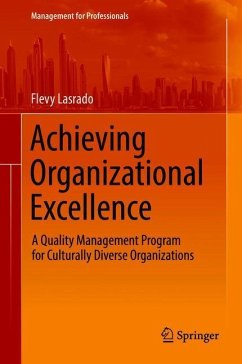
The Handbook of Cross-Cultural Management Research
Versandkostenfrei!
Versandfertig in 1-2 Wochen
162,99 €
inkl. MwSt.

PAYBACK Punkte
81 °P sammeln!
Renowned international experts Peter B. Smith, Mark F. Peterson, and David C. Thomas, editors of the The Handbook of Cross-Cultural Management, have drawn together scholars in the field of management from around the world to contribute vital information from their cross-national studies to this innovative, comprehensive tome. Chapters explore links between people and organizations, providing useful cultural perspectives on the most significant topics in the field of organizational behavior-such as motivation, human resource management, and leadership -and answering many of the field's most con...
Renowned international experts Peter B. Smith, Mark F. Peterson, and David C. Thomas, editors of the The Handbook of Cross-Cultural Management, have drawn together scholars in the field of management from around the world to contribute vital information from their cross-national studies to this innovative, comprehensive tome. Chapters explore links between people and organizations, providing useful cultural perspectives on the most significant topics in the field of organizational behavior-such as motivation, human resource management, and leadership -and answering many of the field's most controversial methodological questions. Key Features Presents innovative perspectives on the cultural context of organizations: In addition to straightforward coverage of structures and processes, this Handbook addresses locally distinctive, indigenous views of organizational processes from around the world and considers the interplay of climate and wealth when analyzing how organizations operate. Offers an integrated theoretical framework: At the start of each substantive section, the Editors provide context for the upcoming chapters by discussing how prevalent cultures in different parts of the world place emphasis on particular aspects of organizational processes and outcomes. Boasts a global group of contributing scholars: This Handbook features contributing authors from around the world who represent an outstanding mix of respected, long-standing scholars in cross-cultural management as well as newer names already impacting the literature. Provides an authoritative agenda for the future development of the field: All chapters conclude with a list of promising avenues for further research and a focus on issues that remain unresolved. Intended Audience This Handbook is an ideal resource for researchers, instructors, professionals, and graduate students in fields of business, management, and psychology.














